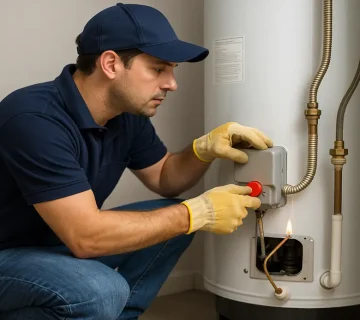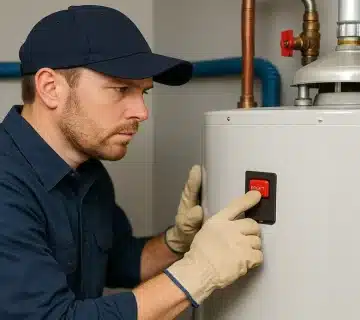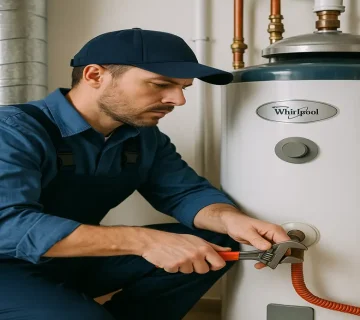Repair or Replacement is a critical decision when it comes to your water heater. Your water heater is one of the most essential appliances in your home, ensuring hot water flows when you need it. However, like any equipment, it can wear down over time. Knowing when to opt for repair or replacement can save you money and prevent unexpected breakdowns. Here are 7 critical warning signs to look out for. You can also find us on Bing Maps for our location and directions.
1. Repair or Replacement for an Aging Water Heater
If your water heater is over 10-15 years old, it’s nearing the end of its lifespan. While regular maintenance can extend its life, an aging water heater is more prone to leaks and inefficiency, making replacement the better choice. Older units are often less energy-efficient, leading to higher utility bills. Consider upgrading to a modern water heater with advanced features to maximize efficiency and savings. Discover our services on Manta.
2. Repair or Replacement for Inconsistent Water Temperature
Are you noticing fluctuations in water temperature? If your water heater struggles to maintain consistent heat, it’s a clear sign of internal issues. Sediment buildup or a failing thermostat could be the culprit. Repair may solve minor problems, but persistent temperature swings often indicate the need for replacement. Upgrading to a newer model ensures reliable performance and consistent hot water.
3. Repair or Replacement When You Hear Unusual Noises
Hearing banging, popping, or rumbling noises? These sounds usually occur when sediment builds up at the bottom of the tank. Over time, this buildup hardens, reducing efficiency and causing strain on the unit. While flushing the tank can help in some cases, excessive buildup can damage the tank and lead to replacement. A quiet water heater is a sign of a well-functioning system, so don’t ignore unusual sounds.
4. Repair or Replacement Due to Rusty Water
If your hot water appears rusty or discolored, it could be a sign of corrosion inside your water heater tank. Rust not only affects water quality but also compromises the structural integrity of the tank. While replacing the anode rod might fix the problem temporarily, extensive rust damage often requires a full replacement. Consider a water heater with a glass-lined tank to prevent future corrosion.
5. Repair or Replacement for Leaks Around the Water Heater
Water pooling around your heater is a serious issue. Leaks can lead to water damage and signal structural issues with the tank. Even small leaks can escalate quickly, causing damage to flooring or nearby appliances. While small leaks can sometimes be repaired, significant or recurring leaks typically mean it’s time for a new unit. Regularly inspecting your water heater for leaks can help you catch issues early.
6. Repair or Replacement for Rising Energy Bills
An inefficient water heater can cause your energy bills to spike. Older units or those struggling to heat water effectively consume more energy. Modern water heaters are designed with energy-saving features, such as improved insulation and high-efficiency burners. Replacing your old unit with an energy-efficient model can save you money in the long run. You can explore energy-efficient water heater options at Energy.gov.
7. Repair or Replacement for Frequent Repairs
If you’re frequently calling for repairs, the costs can quickly add up. Chronic issues often point to an aging or defective water heater. In these cases, replacing your water heater is often more cost-effective than continuously fixing a failing system. A new water heater provides peace of mind, fewer repair expenses, and improved performance.
Repair or Replace: How to Decide
When deciding whether to repair or replace your water heater, consider these factors:
- Cost of Repairs vs. Replacement: If repairs cost more than 50% of a new unit, replacement is usually the smarter choice.
- Efficiency: Upgrading to a newer, energy-efficient model can reduce utility bills and environmental impact.
- Lifespan: A newer unit will likely last longer, providing peace of mind.
- Household Needs: If your family has grown, you may need a larger water heater to meet increased demand.
Maintenance Tips to Extend Lifespan
To avoid frequent repairs or premature replacement, follow these maintenance tips:
- Flush the Tank Regularly: Remove sediment buildup by flushing your water heater once a year.
- Check the Anode Rod: Inspect and replace the anode rod every 2-3 years to prevent corrosion.
- Insulate the Tank: Use an insulating blanket to reduce heat loss and improve efficiency.
- Schedule Professional Inspections: Have your water heater inspected annually by a professional to catch potential issues early.
Final Thoughts
Recognizing the warning signs early can help you avoid unexpected water heater failures. Whether you choose repair or replacement, addressing the issue promptly is key. A proactive approach not only ensures consistent hot water but also saves you money in the long run. For professional guidance and service, contact Value Water Heaters today. We’ll help you make the best decision for your home and budget.
Optimize your water heater’s performance! Explore our expert repair and replacement services now at Value Water Heaters. Follow us on Pinterest for more updates, tips, and inspiration.





